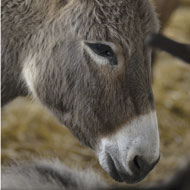
Animal welfare can be improved despite owners living in poverty
It is possible for horse owners to make changes that improve the welfare of their animals without threatening their own livelihoods, according to a study led by international animal welfare charity, Brooke.
Working donkeys, mules and horses support many people living in poverty around the world. Sadly, this association with poverty means that many of the animals, like their owners, experience serious hardship and health problems.
The study, published in PLOS ONE, found that the use of participatory invention methods allowed horse owners to have control over the changes they made. This makes it less 'risky' in terms of affecting income and is more sustainable over time.
Academics from the University of Bristol's School of Veterinary Science worked with horse owners in Jaipur, India, to try to reduce levels of lameness which is commonly found in their horses.
Over 400 owners of 862 horses were recruited for the study - either as part of a control group or intervention group. Results were evaluated in terms of reductions in lameness severity and limb abnormalities in the intervention group compared to the control group.
The intervention was successful in reducing the amount and severity of lameness in the intervention group participants. This was achieved by owners finding ways to make changes in how they managed and worked their animals. The participatory method used encouraged owners to support each other in implementing these changes.
Dr Whay, reader in Animal Welfare and Behaviour in the School of Veterinary Sciences, said: “This research is extremely important in that it shows that it is feasible and possible to improve the welfare of animals, despite their owners living in quite profound poverty.
“The key to the project is the use of participatory methods that directly involve the horse owners and put them in control of the changes they make to the management of their animals. The research team also believe this is the first study of its kind to quantify the impact of a participatory intervention on an animal welfare issue.”
Melissa Upjohn, research co-ordinator for the Brooke, added: “The Brooke is an evidence based organisation and we need to understand whether our interventions are effective. It’s studies like this that help us do that. The methods of this study also tie in with the Brooke’s overarching approach - using community engagement to build owner's skills. We believe that showing people how to care for their animals themselves is the best way to improve working equine welfare in the long-term.”



 The BSAVA has opened submissions for the BSAVA Clinical Research Abstracts 2026.
The BSAVA has opened submissions for the BSAVA Clinical Research Abstracts 2026.